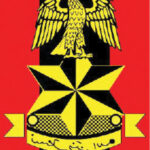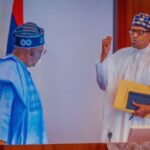On the night of Thursday, 20 October 2022, the sleeping village of Amorka in Ihiala local government of Anambra State was woken by intermittent sounds of a gunshot that rocked the air at about 11 pm, sending shivers down the spines of the community.
With no one taking the risk to confront the gunmen, they left ruins of burnt trucks and shops in the community bordering Imo State, located on a highway connecting the Southeast region of Nigeria to the South-south.
What was left to show the outside world what happened in the community were videos posted on social media.
One of the videos on Facebook showed burnt trucks along the road billowing with smoke and charred remains of the product one of the trucks carried, littered on the ground.
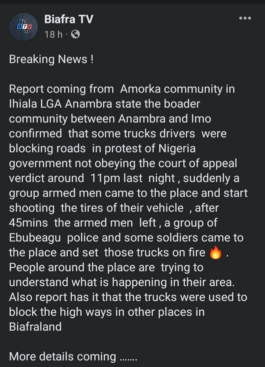
Screenshot of posts alleging the incident that happened in Amorka(Biafra TV, IPOB Community Radio, Biafra TV),(Source:Crowdtangle using Facebook)
However, this video had the following text: “Breaking News! A report from the Amorka community in Ihiala LGA Anambra state, the border [sic] community between Anambra and Imo confirmed that some truck drivers were blocking roads in protest of the Nigeria government not obeying the court of appeal verdict around 11 pm last night.”
It went on to say: “Suddenly, a group of armed men came to the place and started shooting the tires of their vehicle. 45 mins after the armed men left, a group of Ebubeagu police and some soldiers came to the place and set those trucks on fire. People around the place are trying to understand what is happening in their area. Also, reports have it that the trucks were used to block the highways in other places in Biafraland, more details coming”.
Background
The message indicated that the precursor of the attack on the community was related to the continued detention of a leader Nnamdi Kanu, who was an activist for the restoration of the dissolved breakaway region during the then Nigerian civil war of the Indigenous People of Biafra (IPOB). Following his rendition from Kenya, Kanu has been in detention with the Department of Security Service (DSS) since June. After the court of appeal freed him, a secessionist group feared a sudden attack on the Southeastern part of the country.
Even after the order for his release, the federal government refused to let him go, announcing two weeks later that Kanu was still in detention because he posed a flight risk and yet intended to leave the country when freed. The government also claimed that Kanu’s arrest was due to his violent call to establish Biafra.
However, the group denied these claims pointing out that the security outfit it created is a way to curb the insecurity that has worsened over time in the region.
An investigation by the BBC revealed how members of the group, who are basically outside the country, used Facebook to incite ethnic violence and call for the death of those who refused to carry out the orders it issued, especially the sit-at-home order on Mondays in line with the continued detention of Kanu.
The investigation documented how one of its supporters, Nneka Igwenagu, called a youth leader in Anambra State a chicken that does not need to be alive. A few weeks later, the leader was killed for resisting to comply with the sit-home order in their community.
With the armed branch comes a new wave of violence that has affected everyone in the region. It has also led to the creation of splinter groups, escalating attacks by gunmen in the region.
Since no group is claiming responsibility for any attack that occurs there, the media has adopted the phrase “unknown gunmen” while reporting attacks by separatist groups who often target military personnel, government infrastructures, and workers.
How the attack was reported
To understand how the reporting of this attack, CrowdTangle was used to aggregate mentions of the incident on Facebook. On the other hand, an advanced search showed the mentions of the report on Twitter.
CrowdTangle churned out over 100 posts from various groups with a total of 9,291 social interactions, including the aftermath video of the incident and the text blaming the military and Ebubeagu, a regional security outfit created by governors of the region, for the attack, as well as a press statement, two days later, by IPOB reiterating the position.
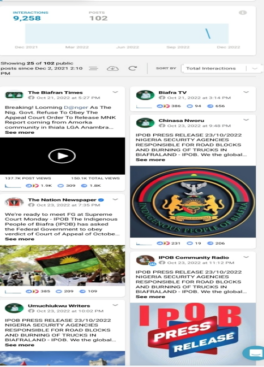
Total number of posts and interactions on Facebook (Crowdtangle search),(Source:Crowdtangle using Facebook)
Another search revealed news reports that unknown shooters perpetrated the attack. However, this narrative included shops getting burnt in the incident, unlike the earlier one that only highlighted burnt trucks.
Since Twitter showed a few tweets regarding the incident, Facebook was the leading platform for reporting the attack.
The first post, which had the video, was initially posted by a page, Chinasa Nworu, at 2:50 pm. The content on the page showed that the owner is a Biafran activist with 38,775 followers. The page was created on May 24, 2020, and is administered from Kuwait.
The video received ~2,000 views and was shared 155 times. These figures are less compared to the ones in the Biafran Times.
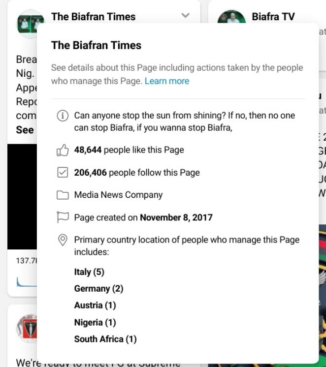
Sample posts of the Biafran page description and the total number of interactions of the page (The biafran Times, The Biafran Times),(Source:Crowdtangle using Facebook)
The page has the description “Can anyone stop the sun from shining? If no, then no one can stop Biafra if you wanna stop Biafra,” and 48,612 likes with 206,148 followings.
While describing itself as a media news company created on 8 November 2017, its administrators are mainly from outside the country. Five people control it from Italy, two from Germany, and three, each from Austria, Nigeria, and South Africa.
An analysis of the post showed that it had ~137,000 post views with a total view of ~150,000 and ~1,800 shares.
According to the analysis by CrowdTangle, 35 pages also posted the same video with the write-up. Most of these groups have the same affiliation with the propagation of the Biafran cause.
Our analysis indicated coordinated networks to amplify the narrative that the military committed the attack. This is because the posts were a few minutes apart from one another.
As if the coordinated misinformation was ineffective, the Media and Publicity Secretary of IPOB, Emma Powerful, issued a statement denouncing the protest as contained in the post. In the statement, Powerful blamed the military for forcing truck owners to make the blockade to support the detained IPOB leader, to cause economic hardship to the people.
He said this tactic was to fuel artificial food scarcity in the region to make food prices skyrocket: “…unequivocally state that Nigeria Government through her Security Agencies namely the Military, DSS, and Police are responsible for the so-called Truck drivers’ road blockage protest for the release of MNK”.
“The public should know that it is the Nigeria security that forced the drivers to block roads with their trucks and the same security agents with Ebubeagu militias that set fire to those trucks carrying goods to the East, not ESN, unknown gunmen, or criminals. Today, 21 October 2022, these Government terrorist Security Agents blocked all the major routes to the Eastern Region/Biafra land (Igbo land) and refused all trucks carrying goods into Biafra. In the end, they set fire to those trucks loaded with consumable goods”.
While linking the blockade to a weapon of war used during the 1967-1970 Biafran war, he identified the blockade as “Enugu-Aba-Igweocha expressways were also blocked with six trucks. Seven trucks blocked the Enugu-Onitsha expressway near the toll gate. Some truck drivers also blocked Obolo Afor, Enugu state.”
Was there a protest in Ihiala
According to the post, the incident occurred at Amorka in Ihiala local government. Still, an earlier post on one of the Facebook pages, Umuchiukwu Writers, pointed out that a protest occurred on a highway called Aba/PH expressway.
The post, with a video, said the protest was against the unlawful detention of Kanu and the association of truck drivers in Aba organised it. It added that “Video evidence has shown that the drivers have already abandoned today’s work, as they collectively seek justice for Kanu, who is currently being held unlawfully by the Department of States Security under the command of the Presidency”.
The post also stated that one of the drivers who spoke said they were mobilising to shut down all parts of Nigeria if the government disobeyed the court.
With no evidence to corroborate the protest in Ihiala, another page promoting IPOB propaganda, Eagle Media TV Nigeria, doctored the video of the Amorka incident and the demonstration in Aba to show the narrative that there was a protest in the community.
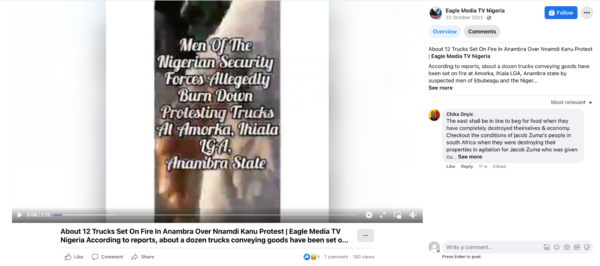
The screengrab of the doctored video that was highlighting the protest (Eagle Media TV),(Source:Crowdtangle using Facebook)
The video also used voice-over to narrate what happened in the event and showed the burnt trucks and vehicles in traffic to prove there was a protest.
Just like the coordination in the Amorka post, the statement issued by Powerful also shows the same pattern pages as that of Chinasa Nworu, Umuchiukwu Writers, and Biafta Tv, among others, made two posts on their pages.
The incident was amplified on these platforms to escalate the differences between the government of Nigeria and the people of the region, who feel marginalised.
The misinformation was spread despite The Anambra State Police Public Relations Officer, DSP Ikenga Tochukwu, describing the incident as a case of robbery and arson.
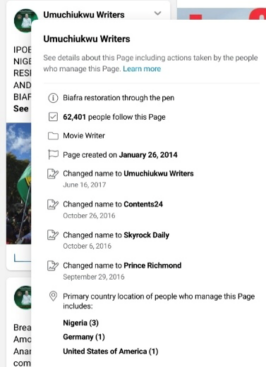
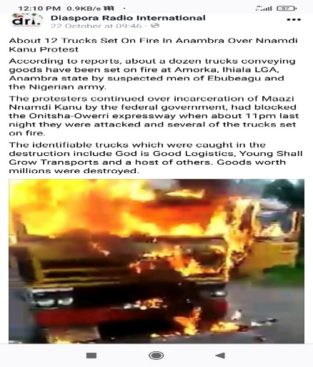
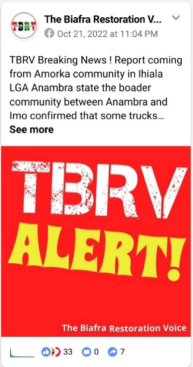
Sample posts from various Facebook pages sharing the incident (Biafra TV,UmuchukwuWriters,Diaspora Radio International,Biafra Restoration),(Source:Crowdtangle using Facebook)
The second narrative, mainly reported by mainstream media, stated that yet-to-be-identified shooters carried out the incident. The report further said the sources fingered IPOB members who protested their leader’s detention, despite the court order.
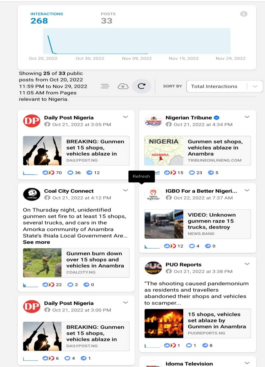
Sample posts highlighting the incident being carried out by unknown gunmen(Source:Crowdtangle using Facebook)
Another source claimed that the hoodlums also dropped sheets of paper with typed messages, saying there would be no peace until Kanu was released. Even though IPOB admitted that some groups are using its name to commit crimes in the region, the claim that the military was behind the attack is false. This is because the group and its supporters only gave half the facts of what transpired in the community.
When the DSP Ikenga was contacted, he said an investigation was yet to be completed on the incident but reiterated it was an attempt to rob a truck with perishable goods. When they discovered that the truck was not containing what they intended to carry, they got angry and set it ablaze, which affected other things around the area.
While stating that the witnesses of the incident have come forward with the information they have, he said the attackers’ identities are yet to be confirmed, but “whatever guise or umbrella anybody wants to use to commit crime, we will unmask the person”.
When asked if the fire affected the shops, he affirmed that the fire consumed everything within its path at the scene.
This article was produced with mentorship from the African Academy for Open Source Investigations (AAOSI), to tackle disinformation that undermines democracies, as part of an initiative by the International Centre for Journalists (ICFJ) and Code for Africa (CfA) in partnership with the Daily Trust Foundation.
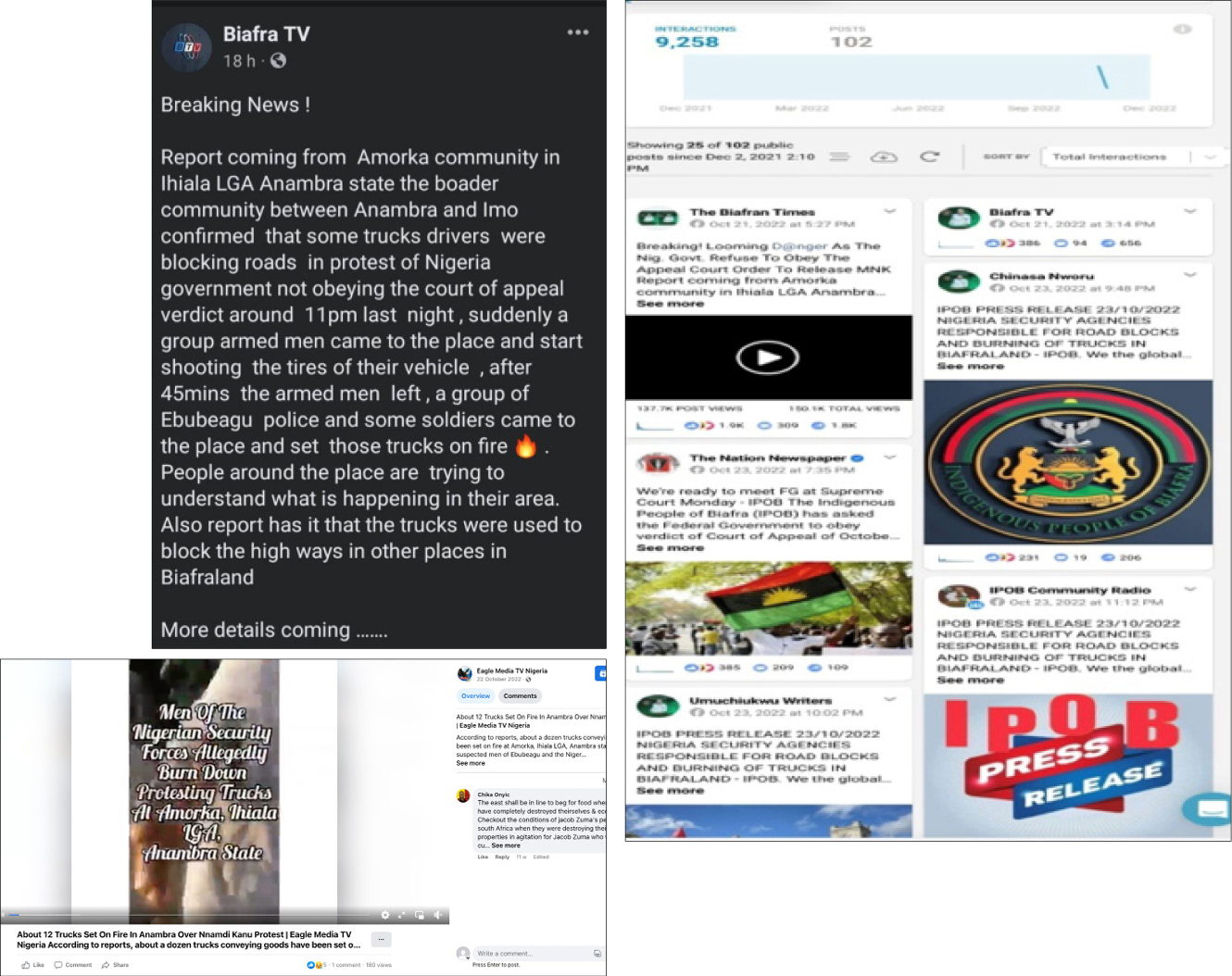
 Join Daily Trust WhatsApp Community For Quick Access To News and Happenings Around You.
Join Daily Trust WhatsApp Community For Quick Access To News and Happenings Around You.